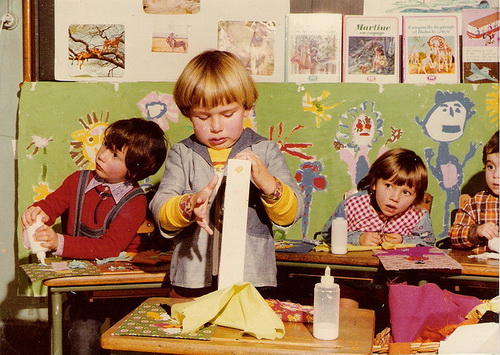
One of the perennial questions we get from readers and families moving to Beijing is “How do I choose a school for my kids?” It’s a huge, tangled, and often emotional topic, provoking heated debate on parenting forums like Beijing Mamas. If there’s one thing we learned while researching this article, it’s that the reasons are varied, complex, and deeply personal.
Most international schools begin the academic year in mid- to late August. Admissions departments usually recommend researching schools at least six months in advance and visiting no later than February or March. Many parents initially come to Beijing on a “look-see” tour guided by their relocation company, which often involves cramming visits to several schools and apartments within a matter of days. Having a clear idea of what you’re looking for helps narrow down the choices and visiting sooner rather than later can help allay fears about adapting to a new country. Though we can’t tell you which choice is right for your family, we hope to at least offer a starting point for those who are just embarking on their search.
Individual Aptitudes
It may be your child’s individual talents, interests, and personality that turn out to be the deciding factor. When asked how much children should be involved in the decision process, Gea Visscher, a child and educational psychologist at Dulwich College Beijing (DCB), says it depends on age. “Of course, older children should be involved. At the same time, you are the parent and in the end you make the decision. You know your child and you can anticipate things in the future. Children, in particular teenagers, make emotional decisions.” Visscher, who is originally from the Netherlands, is also the head of learning support for the Senior School and the head of the Student Services Center.
If you do want your child to be involved in the thinking process, make their participation meaningful. If they’re able to join for the school visit, ask them to come up with questions for teachers, admissions officers, or current students. See if the Admissions department can arrange for them to meet people within the school so they can gather information and form their own conclusions. “You can ask for their impressions and observations, but always make clear before everything that ‘I highly value your input and I really take it seriously, but at the end of the day I make the decision,'” says Visscher.
Visscher’s colleague, Choon Eichman, is currently a marketing associate at the school. Prior to this, she worked in the Admissions department ever since DCB opened in 2005. During her tenure, the office processed over 4,000 applications. Eichman shares the story of an American family that visited DCB in July. They had a son entering Year 12 – an exam year for the IGCSE. “I was very upfront about what we offer and that it would be hard work coming in,” she says. “In the end, he chose our school. I’m sure they discussed it together and he had some input. In that situation, I think it was fair. He was old enough to make that choice.”
Each school has its own strengths. If your child is musical, for example, they might feel at home at DCB with its soundproof practice rooms, iMac music composition suite, range of music ASAs, international school music festivals, and Musician in Residence program. If they’re athletic, any number of the larger international schools have a range of extracurricular sports and teams that compete in inter-school tournaments like ACAMIS, APAC, and ISAC.
Educational Goals
“A lot of parents would like their children to learn Chinese, so some may choose to go to a Chinese school first or a bilingual school,” says Eichman.
“At the end of the day, where do I want to send my child for university?” she asks. “If it’s an English-speaking environment, you have to make the transition earlier rather than later.” She speaks from personal experience. Eichman is from Singapore and her husband is American; they decided to send their two sons to a local Chinese school before switching them to DCB in Grade 5.
When parents are not sure what they’re looking for in a school, Eichman likes to ask them about educational goals for their kids. “Do you like structure or do you like the free-and-easy flow type of school? Do you like American-style or British-style education?”
“Think about short-term and long-term educational planning for your child,” adds Visscher. “Look at how your child has been doing thus far at their school. When you think about it, combine that and reflect on your child as a unique individual. I think that all of us at the international schools highly value working with parents.”
Curriculum
If you’re considering a school with a curriculum that you’re not familiar with, it’s crucial to ask questions about what the school is teaching and how they are teaching it. “In the end, you have to guide and coach your child with adjusting to the system. When you’re completely blank, it’s harder to relate to them,” says Visscher.
Particularly for middle and high school students, it’s important to find out and understand how homework is handed out and assessed. Is it assigned through an online portal? Do parents have access to their child’s login details? Can someone at the school teach them how to use it?
“I love parents who ask a lot of good questions because they are thinking parents,” says Eichman. “You have the hardware and the software, and the software is so much more important. It’s nice to have the swimming pool and all, but it’s the teaching, learning, and pastoral care – how we care for each individual child – that are so important.”
Student Support Services
There’s more and more recognition for the importance of catering to the social and emotional needs of students. For instance, “pastoral care” is the term that DCB uses for the individual student care and support. In Early Years and Junior School, the homeroom teacher is the pastoral “caretaker” for their group of students. In Senior School, students have a form tutor who meets with them every morning to touch base and share relevant information. These teachers are the first point of contact for parents and students when there’s a question or a concern.
The pastoral care system also addresses rotating themes like values, which are discussed in class throughout the school for that week. In her role as an education psychologist, Visscher sometimes performs psycho-educational assessments with the parents’ permission when there’s a concern about a child’s development or learning ability.
Asides from social-emotional care, families might also consider whether the school offers EAL (English as an Additional Language), CSL (Chinese as a Second Language), one-on-one tutoring, support for learning disabilities or special needs, or a gifted and talented program.
Location
In a city as sprawling as Beijing, traffic and travel time have to be taken seriously. If you live downtown and want to send your kids to school in Shunyi, that could tack on an extra 30 to 45 minutes of bus time each way. Proximity to your child’s school or the office makes a significant difference to quality of life in Beijing – perhaps even more so for sleep-deprived students who must wrestle with loads of coursework every night or younger children with separation issues. If your kids participate in after-school activities, factor in how late they’ll be done and whether they’ll have enough time to complete their homework. Several parents we spoke to advised finding the school first and looking for housing second.
Language
When choosing a school, one of the most basic considerations is language. “When you move to another country, the question is ‘Is it the first time that the children are exposed to English or not?'” says Visscher.
“[The family] must keep in mind how long they will stay here. If they know it’s only one or two years and they would return for certain to their home country (like Germany or France), it makes sense to look for a continuation of the education in German or French.”
Expats have several options for continuing their children’s education in their mother tongue, including Russian, German, French, Swedish, and Dutch. Apart from the government-subsidized embassy schools like the French International School of Beijing and the German School of Beijing, several of the larger international schools also offer mother tongue language programs. For example, the Western Academy of Beijing (WAB) has Danish, French, Finnish, Dutch, and German programs. Depending on the language, some are offered as after-school or weekend programs (usually open to students from other schools), day programs integrated into the WAB curriculum, or both. Other schools with mother tongue language support include DCB (Mandarin and German) and, starting from the 2015-2016 academic year, the International School of Beijing (ISB).
“But if the children are either exposed to international education and an English education, or you know you will stay longer, it’s a different story,” says Visscher. In that case, she advises examining different schools, the programs they offer, and your child’s individual traits and capabilities. You might even choose different schools for different children. “Some children work better in a highly-structured and others in a more loose and creative environment. Parents know their children best,” she advises.
“Friends have asked me why I don’t send my kids to a local school,” says one WAB mom, who asked to remain anonymous. Her children are native English speakers. “My response was that with the life we live, we try to keep as much consistency in our kids’ lives as we can. It wouldn’t be fair for them to have to learn a new language from scratch each time we are posted to a different country – more or less every three years. It wouldn’t be fair to add the academic pressure on top of it.”
Parents who want their kids to learn Chinese have another set of questions to consider: Is it more important that they be bilingual (English and Chinese) or build a foundation in Chinese first? If they’re very young (under 5), would you consider sending them to a local school? Will you be in Beijing for a while?
Parent Quotes:
“We chose MSB for two reasons: the Chinese language program (I have been told my multiple old China hands that MSB’s program is the best) and proximity to home.”
“This is our second time in Beijing. When we were first here, the kids were very young. We lived downtown and moved from the UK, so they went to BSB Sanlitun. When we left China, we switched to an international system because we wanted them to take IB. When we learned we were coming back, we already had a good idea of the school we wanted. We applied to ISB and WAB (one does not simply apply to one!) and got accepted to both. We chose WAB based on friends’ recommendations and communication with the school during the application process. We then visited on a look-see tour, which confirmed to us we were making the right choice.”
“Our kids are very young and this is their first time at an international school. My spouse’s employer, which is paying the school fees, only allowed us a choice between CISB and LFIP. At the time, our kids did not speak English. However, we wanted them to be bilingual as young as possible. We visited both schools with the idea of applying for the bilingual section if we chose LFIP. In the end, we chose CISB for several reasons, including the fact that they accommodated our request to admit our daughter into preschool despite her being born after the cut-off date, the buildings and infrastructure seemed more comfortable, and there is a free tutoring program for non-native English speakers.”
“We chose Fangcaodi because we wanted a strong foundation in Mandarin for our daughter, who is half-Chinese and born here. Added bonuses were the downtown location and reasonable price, which fit our location and budget.”
“We chose DCB because it offers the English National Curriculum (we’re from the UK), small class sizes, a great Early Years program, a lovely campus design and facilities at Beijing Riviera.”
“My children attend Daystar. My decision was based first on finding a truly bilingual environment with Chinese language and math. However, I wanted to emphasize Chinese without sacrificing English. Secondly, many of my friends who had the same educational goals sent their children to Daystar.”
Still unsure about which school to send your kids to? Join us today for the Beijing International School Expo at Kerry Hotel from 10am-4pm, the first day of a weekend-long fair gathering 50 education exhibitors from around Beijing. Choon Eichman, one of the interviewees featured in this story, will be part of a parent panel on Sunday.
This article originally appeared in the 2015-2016 beijingkids School Choice Guide. Click here for your free online copy. To find out how you can obtain a hard copy, contact distribution@truerun.com.
Photo: Môsieur J. (via Flickr)




